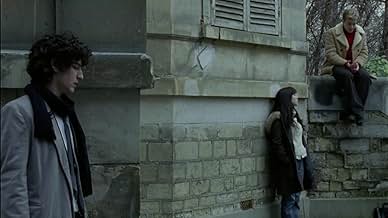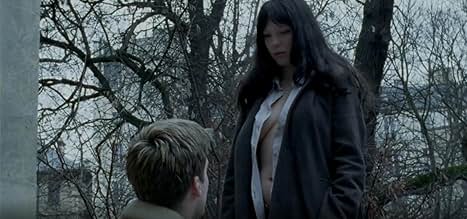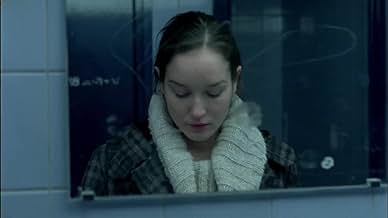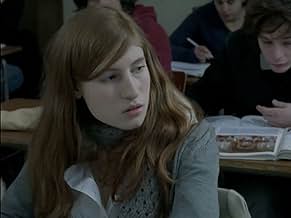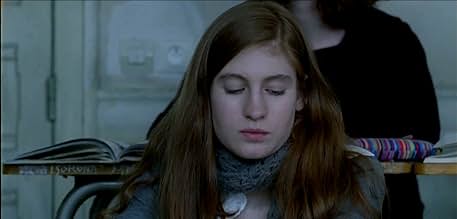AVALIAÇÃO DA IMDb
6,6/10
8,4 mil
SUA AVALIAÇÃO
A linda Junie inicia as aulas na mesma escola e classe de seu primo, Matthias, após a morte de sua mãe. Ela conhece os amigos dele. Os meninos querem namorá-la - até mesmo o belo e jovem pro... Ler tudoA linda Junie inicia as aulas na mesma escola e classe de seu primo, Matthias, após a morte de sua mãe. Ela conhece os amigos dele. Os meninos querem namorá-la - até mesmo o belo e jovem professor de italiano.A linda Junie inicia as aulas na mesma escola e classe de seu primo, Matthias, após a morte de sua mãe. Ela conhece os amigos dele. Os meninos querem namorá-la - até mesmo o belo e jovem professor de italiano.
- Direção
- Roteiristas
- Artistas
- Prêmios
- 2 vitórias e 4 indicações no total
- Direção
- Roteiristas
- Elenco e equipe completos
- Produção, bilheteria e muito mais no IMDbPro
Avaliações em destaque
..yea.. she's a real winner... ..she teases and torments her 'friend' to his ultimate demise.. ..and with her other love interest, she feels very strongly about him, but must leave and go far, far away... for he is just too beautiful, and although he proclaims he loves her, in the end she knows he will ultimately leave her for another.. ..(and who decided to cast him in that role.. at times he looks and acts more like a student than they do).. ..all that, and a bunch of confusing side story lines, adding nothing at all to the main story.. ..the French have mastered these kinds of productions.. too bad in this one the efforts of a good number of talented young actors went to waste
Sadly on this site we get mostly American reviewers, and the fact that this film is set in an enclosed world and not one of an ' ordinary school ' seems to elude them. Christophe Honore, in this one of his most perfect films took on a brave task and that is in treating Madame de La Fayette's equally perfect ' Princesse de Cleves ' into a story relevant to the 21st C. I believe his achievement works brilliantly. and his setting of a classroom for a 17th C. Court. He quite rightly makes this a place where letters replace emails, and I for one adjusted to this immediately. The hermetic universe of passions, intrigue and tragedy is given more focus by not being ' real ' in the sense that a modern French classroom most certainly is. This is his genius in achieving total involvement by concentrating on the conflict of emotions, and also giving both heterosexual and homosexual desires and sentiments equal status. I am not sure what Madame de La Fayette would have thought of that, but although unspoken in her world it must have been part of it. The acting was superb, and the casting to me as right as the concept. It saddens me that the education in the Anglo-Saxon world is not as in touch with Classical literature and Philosophy as it is still in French schools and that to my knowledge this masterpiece is not available on DVD in the UK. It is a loss among so many losses as we move further and further away from mainland Europe and a true understanding of a film as great as this.
Christopher Honoré's La belle personne is a compelling curiosity; transposing the courtly world of Madame de La Fayette's classic 17th century story, La Princess de Cleves to a modern-day French lyceé (with its own courtyard), the film is a compelling observation of "courtly" love in a postmodern world; although it would be convincing to argue La belle personne is not very modern in its presentation of present-day bourgeoise Parisian etudiants. This is a world that exists in its own hermetically-sealed bubble, free from Facebook and the internet. It's a world where 60s navel-gazing reigns supreme.
The film follows the tribulations love brings, or perhaps more realistically, the tribulations of what one perceives as 'love', even if it's unconsummated. The title alludes to 17-year-old Junie (Léa Seydoux), whose aura and presence recalls a ghostly incarnation of Godard's muse Anna Karina (Perhaps a self-conscious homage to Godard by the FEMIS-teaching Honoré?). Following the death of her mother, Junie refuses to live with her father (for unknown reasons), choosing instead to live with her cousin, Mathias, in a haute-bourgeoisie Parisian arrondisement close to the school she and Mathias attend. ' Soon enough Junie becomes the default objet d'amour for the male etudiants, namely love-sick Otto (Grégoire Leprince-Ringuet) at first.
However, she soon troubles the cad-in-school Italian teacher, Nemours (the lanky yet ever-foppish Louis Garrel) with her otherworldly presence, prompting him to quickly end two amorous entanglements with a middle-aged fellow teacher and a stubborn 16-year-old female student. However, as one would expect fron the source material, tragedy foreshadows this story but it does not detract from this near-perfect made-for-TV drama.
Every performance is realistic and natural. Special kudos to Garrel and Sedoyx for their work here. Honore follows the mis-step that was Chansons D'amour with this elegant, masterfully composed concoction; even if you could argue La belle personne seems to be an inverse reworking of Chansons. With the ensemble of regulars (Garrel, Hesme, Mastroianni, Leprine-Ringuet etc), traversing both films, La belle personne perversely feels like a sequel somehow taking place in a parallel world to Chansons. In spite of some questionable if strained directorial nods to the Nouvelle Vague (mentioning them would spoil the end), Honoré shows restraint and an uncharacteristic sense of detachment. The way he directs Seydoux is a revelation. Her ghostly presence haunts the film in every aspect and should be noted as a performance of great integrity and resolve from this promising actress. As a modern-day exploration of courtly love, La belle personne, is worth seeing numerous times to catch the many subtleties it withholds on first viewing.
The film follows the tribulations love brings, or perhaps more realistically, the tribulations of what one perceives as 'love', even if it's unconsummated. The title alludes to 17-year-old Junie (Léa Seydoux), whose aura and presence recalls a ghostly incarnation of Godard's muse Anna Karina (Perhaps a self-conscious homage to Godard by the FEMIS-teaching Honoré?). Following the death of her mother, Junie refuses to live with her father (for unknown reasons), choosing instead to live with her cousin, Mathias, in a haute-bourgeoisie Parisian arrondisement close to the school she and Mathias attend. ' Soon enough Junie becomes the default objet d'amour for the male etudiants, namely love-sick Otto (Grégoire Leprince-Ringuet) at first.
However, she soon troubles the cad-in-school Italian teacher, Nemours (the lanky yet ever-foppish Louis Garrel) with her otherworldly presence, prompting him to quickly end two amorous entanglements with a middle-aged fellow teacher and a stubborn 16-year-old female student. However, as one would expect fron the source material, tragedy foreshadows this story but it does not detract from this near-perfect made-for-TV drama.
Every performance is realistic and natural. Special kudos to Garrel and Sedoyx for their work here. Honore follows the mis-step that was Chansons D'amour with this elegant, masterfully composed concoction; even if you could argue La belle personne seems to be an inverse reworking of Chansons. With the ensemble of regulars (Garrel, Hesme, Mastroianni, Leprine-Ringuet etc), traversing both films, La belle personne perversely feels like a sequel somehow taking place in a parallel world to Chansons. In spite of some questionable if strained directorial nods to the Nouvelle Vague (mentioning them would spoil the end), Honoré shows restraint and an uncharacteristic sense of detachment. The way he directs Seydoux is a revelation. Her ghostly presence haunts the film in every aspect and should be noted as a performance of great integrity and resolve from this promising actress. As a modern-day exploration of courtly love, La belle personne, is worth seeing numerous times to catch the many subtleties it withholds on first viewing.
She runs away from abandonment, he runs away from his misery, other runs away from disappointment, from fear. No need to be told in words. Sometimes it could reach the cruelty and frivolity, but that might be the charm of the movie too.
If you get lost in translation, while watching this movie, it's because you didn't learn to the meaning of the words first. Not the kind of movie to start a journey with french cinema, but definitely a good one if you have already dived in the genre.
If you get lost in translation, while watching this movie, it's because you didn't learn to the meaning of the words first. Not the kind of movie to start a journey with french cinema, but definitely a good one if you have already dived in the genre.
When I first encountered this film upon arriving in France in 2008, my grasp of French was tenuous at best. Recommended by a date as an initiation into the intricacies of Parisian life and French identity, I absorbed its essence more through its visual tapestry than its dialogue. Nevertheless, its exploration of youth, love, loss, and tragedy struck a chord, despite a notably contrived poetry scene.
Years later, fluent in French and revisiting the film, I appreciated its cultural references and recognized every Parisian locale. Yet, while its emotional and sexual tensions remained compelling, its narrative seemed less relevant to my current stage of life. The adaptation of La Princesse de Clèves, while timely in its original context, no longer resonated with the depth it once did during my youth.
However, the film's strength lies in its nostalgic depiction of a bygone Paris, albeit one that may appear overly romanticized and out of step with contemporary cinematic depictions. Nevertheless, Paris continues to attract visitors seeking its nostalgic allure, and the film serves as a testament to the enduring appeal of recreating this enchanting past.
While somewhat overlooked, this film merits attention, particularly for those yet to experience its evocative portrayal of Parisian life.
Years later, fluent in French and revisiting the film, I appreciated its cultural references and recognized every Parisian locale. Yet, while its emotional and sexual tensions remained compelling, its narrative seemed less relevant to my current stage of life. The adaptation of La Princesse de Clèves, while timely in its original context, no longer resonated with the depth it once did during my youth.
However, the film's strength lies in its nostalgic depiction of a bygone Paris, albeit one that may appear overly romanticized and out of step with contemporary cinematic depictions. Nevertheless, Paris continues to attract visitors seeking its nostalgic allure, and the film serves as a testament to the enduring appeal of recreating this enchanting past.
While somewhat overlooked, this film merits attention, particularly for those yet to experience its evocative portrayal of Parisian life.
Você sabia?
- CuriosidadesChristophe Honoré decided to make this adaptation of La Princesse de Clèves after French president Nicholas Sarkozy criticized the novel.
- ConexõesFeatured in Clash: Olivia: Hymen (2012)
- Trilhas sonorasWay To Blue
Written and Performed by Nick Drake
Copyright Warlock Music Ltd administered by Kobalt Music Publishing Ltd.
Principais escolhas
Faça login para avaliar e ver a lista de recomendações personalizadas
- How long is The Beautiful Person?Fornecido pela Alexa
Detalhes
- Data de lançamento
- País de origem
- Central de atendimento oficial
- Idiomas
- Também conhecido como
- The Beautiful Person
- Locações de filme
- Empresas de produção
- Consulte mais créditos da empresa na IMDbPro
Bilheteria
- Faturamento bruto mundial
- US$ 748.217
Contribua para esta página
Sugerir uma alteração ou adicionar conteúdo ausente

![Assistir a Bande-annonce [OV]](https://m.media-amazon.com/images/M/MV5BNjgzNWM4MTAtY2Q3ZS00MjliLTlmZTctY2M3NmM2ODUzOWRkXkEyXkFqcGdeQXRyYW5zY29kZS13b3JrZmxvdw@@._V1_QL75_UX500_CR0)



